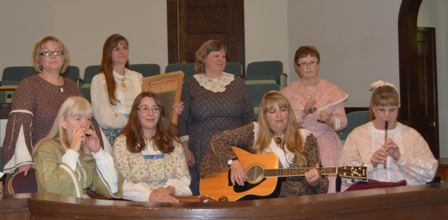MALAD VALLEY WELSH FESTIVAL
 Idaho’s best kept Celtic secret, Malad Valley, is as Welsh as it gets in the USA.
Idaho’s best kept Celtic secret, Malad Valley, is as Welsh as it gets in the USA.
Interestingly, it was a Scottish-Canadian, Donald Mackenzie, who gave the community – one of Idaho’s oldest – its name in 1864 while passing through. The town itself began as a Welsh Mormon settlement, and remains fiercely proud of its roots; each year the Malad Valley Welsh Festival pays tribute to the present that is its past.
Festival Chair Jean Thomas says that, according to researchers at Brigham Young University, Malad has the largest percentage of people per capita of Welsh descent of any city outside of Wales.
“Athough it is changing, the phone book (and the cemetery) is still dominated by Jones, Williams, Evans, Thomas, Davis, Pierce and Edwards’ names. We should have started the festival a generation ago when the ties to those who immigrated to Malad Valley were stronger,” she declares.
Still, in 2014, more than 1,200 people from 15 states and three foreign countries attended the festival. Most of the attendees came from Idaho and Utah, although this year people from Texas, California and Colorado have been asking after the gathering, which takes place June 26 to 28.
The events include everything from Welsh music and dance to displays of Welsh folk costumes, exhibits on the first 25 families to settle in Malad Valley (all of them Welsh), a quilt show, wagon rides to historic sites in Malad, and authentic Welsh food.
According to Thomas, one of the most popular activities at the festival is the educational presentations on Welsh history and culture. This year those include lectures on the role of the harp in Welsh culture, learning Welsh through folk songs, as well as discussions about Owen Glyndwr, the last real prince of Wales.
“All four sets of my grandparents emigrated to the U.S. from the Merthy Tydfil area of Wales in the middle 1800s for both economic and religious reasons,” she says. “I look like a typical Welsh woman – short, stocky with very dark hair and eyes.”
Thomas has been involved with the Welsh Festival almost from the beginning. After hearing about a Welsh society organizing, she attended one of the first meetings. Her family background helped: her sister has written extensively about the Welsh and Welsh literature, and her father was the last person in Malad who knew how to speak the language. When the festival was first proposed, Thomas was a natural to act as co-chair, later becoming chair of the event.
She believes a revival of interest in Welsh heritage is taking place, though there are still a number of challenges.
“Like all heritage movements, I am not sure the younger generations are that interested, primarily because they are more likely to marry someone with a different background and think of themselves and their children as Americans rather than of the legacy of their grandparents and great-grandparents.”
However, Thomas notes that the research that Malad Middle School history students are doing under the direction of their Welsh teacher is helping to introduce younger people to both their heritage and the history of their hometown.
She suggests that the Scots and Irish seem to be better recognized and organized, likely because they began putting together events a couple of generations earlier.
“We all need to support the events and activities that are held in the United States and elsewhere to celebrate Celtic heritage,” she concludes. “That support could be financial but, more importantly, attendance at events. I am looking forward to retirement so that I can travel to festivals and events. Publications like this one are important to letting people all over the world know about our Celtic heritage and that there are a lot of us interested in our heritage.”



















Leave a Comment